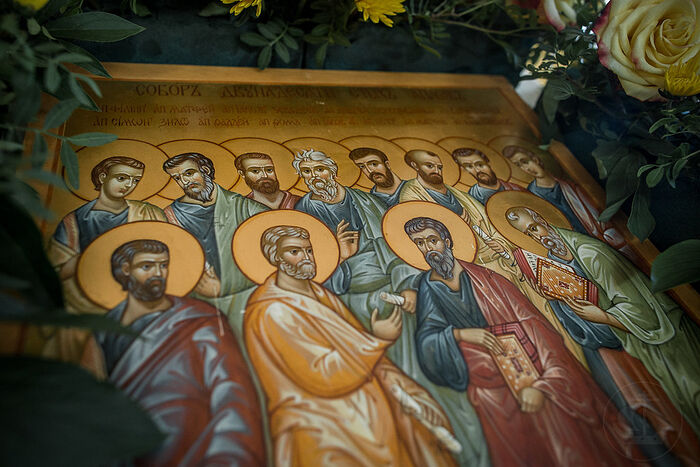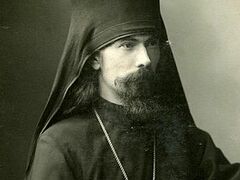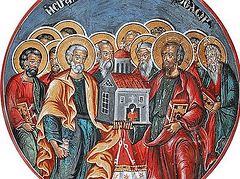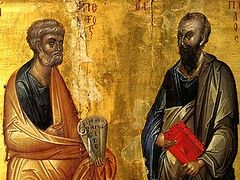Each year on June 30 the Orthodox Church celebrates the Synaxis of the Holy Apostles. The Apostles are not simply the first Christians, but are considered essential to Christianity for we know Christ only through their witness. The Church in its creed claims to be “one, holy, catholic and apostolic.” These words are describing something essential about the Church – we do not simply believe in Jesus, we believe in Christ through the witness of the apostles – their witness is essential to what we each know about Christ. Jesus chose them to be His witnesses, He didn’t write a book about Himself. We rely on them for all that we know about Christ, about God, about salvation, about theology. Fr John Behr notes how indispensable the apostles are to the Church from the very beginning:
Irenaeus [d. 202AD] further examines the relation between Scripture and tradition in the opening five chapters of his third book Against the Heresies, this time to counter the claim of the Gnostics to possess secret, oral traditions. He begins by affirming categorically that the revelation of God is mediated through the apostles. It is not enough to see the “Jesus of history” to see God, nor to imagine God as a partner with whom one can dialogue directly, bypassing his own Word. Rather the locus of revelation, and the medium for our relationship with God, is precisely in the apostolic preaching of him, the Gospel which, as we have seen, stands in an interpretative engagement with Scripture. The role of the apostles in delivering the Gospel is definitive. As Irenaeus puts it:
We have learned from no others the plan of our salvation than from those through whom the Gospel has come down to us, which they did at one time proclaim in public, and at a later period, by the will of God, handed down (tradiderunt) to us in the Scriptures, to be the ground and pillar of our faith…. Matthew issued a written Gospel among the Hebrews in their own dialect, while Peter and Paul were preaching in Rome, and laying the foundations for the Church. After their departure, Mark, the disciple and interpreter of Peter, did also hand down in writing what had been preached by Peter. Luke also, the companion of Paul, recorded in a book the gospel preached by him. Afterwards, John, the disciple of the Lord, who had leaned upon his breast, did himself publish the Gospel during his residence at Ephesus in Asia. These have all declared to us that there is one God, Creator of heaven and earth, announced by the Law and Prophets; and one Christ the Son of God. (AH 3.1.1-2) (John Behr, THE WAY TO NICEA, pp 38-39)
The apostles are essential to our salvation. We would not know Jesus Christ if it were not for them, as they are Christ’s own plan for how the Gospel was to reach the world. St John Chrysostom says:
Are you not aware of this, I ask you, that the Church is placed on earth but its life is lived in heaven? How does this emerge? The facts give clear proof: eleven disciples were under attack, and the whole world did the attacking; but those attacked had the victory, and the attackers were done away with. The sheep prevailed over the wolves: do you see the shepherd sending the sheep amidst the wolves so that they would not achieve salvation even by flight? What sort of shepherd does this? Christ did it, however, to show you that good deeds are done not in the normal course of events but in defiance of nature and normal events. The Church’s roots, in fact, are stronger than heaven. But perhaps the Greek charges me with arrogance: let him await factual proof and learn the force of the truth, how the sun would more easily be snuffed out than the Church disappear. Who proclaims this, you ask? Its founder: “Heaven and earth will pass away, but my words will not pass away.” Instead of simply making this promise, he actually brought it to fulfilment; after all, why did he give it a firmer foundation than heaven? The Church, you see, is more important than heaven. For what reason does heaven exist? For the Church, not the Church for heaven. Heaven is for the human being, not the human being for heaven. This is clear from what he actually did: Christ did not take up a heavenly body. (OLD TESTAMENT HOMILIES Vol 2, pp 82-83)
Christ did not envision a “Jesus alone” Christianity. He envisioned His chosen disciples becoming apostles and bringing new generations of Christians into the Faith. These new believers in turn would become those through whom the Gospel would be lived and proclaimed. The Apostolic Church is the one founded upon the Apostles and who continue to honor and teach what the Apostles themselves proclaimed.
I am astonished that you are so quickly deserting him who called you in the grace of Christ and turning to a different gospel— not that there is another gospel, but there are some who trouble you and want to pervert the gospel of Christ. But even if we, or an angel from heaven, should preach to you a gospel contrary to that which we preached to you, let him be accursed. As we have said before, so now I say again, If any one is preaching to you a gospel contrary to that which you received, let him be accursed. (Galatians 1:6-9)




